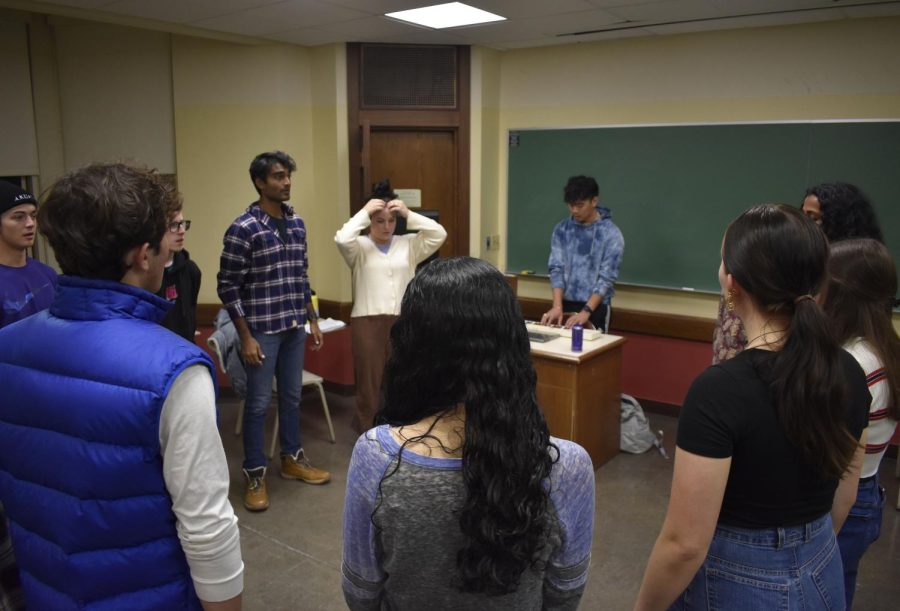‘It’s empowerment and teamwork’: A cappella clubs on campus foster community and musicianship
Romita Das | Senior Staff Photographer
A cappella club Tonal Disruptions practices in the Cathedral of Learning on Thursday night.
September 30, 2022
For Emma Cada, a sophomore political science major and assistant music director for Tonal Disruption, a cappella is more than just making beats — it’s making beats with her a cappella “family.”
“It was our first year, and we kind of were taking the time to develop our sound and kind of meet each other. And now this year, I think what makes us special is we’re very, very tight knit. We are all best friends,” Cada said. “And we just added two new people, and they are already our besties, too.”
Cada first sang “Morning Crawls Towards You, and I” by Good Luck Finding Iris during auditions last year, and joined Tonal Disruption, one of the eight a cappella clubs on campus, during its founding year. Each club has about 15 members, and they hold auditions at the beginning of every school year and compete in the International Championship of Collegiate A Cappella.
Mahitha Vivek, president of Avaaz, a South Asian a cappella group, said she enjoys being able to sing with people with similar cultural backgrounds as her.
“It’s really so special to be able to combine my culture with one of my passions,” Vivek, a senior psychology major, said. “College gets so tough, so having this hobby basically on campus, something that I can work towards to reach an end goal with other people alongside me who have this amazing passion for singing and music.”
According to Vivek, aside from being a fun hobby, having a place in an a cappella club comes with many accomplishments as well. Avaaz recently recorded their own studio album, and Tonal Disruption competed in ICCA semifinals in Buffalo, New York, last spring.
Abby Batkhan, a senior communication science and disorders major and president of C-Flat Run, said the club is currently working on songs by Billie Elish and Third Story, along with the song they do every year, “Give Me All Your Love” by The Alabama Shakes. According to Batkhan, songs that C-Flat Run sings at competitions and events are selected by members of the group.
“Usually, the arrangements we do are made by either people in the group or alumni that are arranging for us,” Batkhan said. “We all listen to them together, and we try to encourage people to vote based on the quality of their arrangement rather than like their favorite song. So it really just depends on who’s in the group that year that dictates what kind of sounds we get.”
While C-Flat Run and Tonal Disruption mainly do American or Western Music, Avaaz incorporates a lot of South Asian music in their a cappella performances. Vivek said one of her favorite memories from Avaaz was their performance at the Pakistani Student Association’s Culture Night.
“The crowd was just so hype and so supportive, and we had a moment of silence after we finished the piece,” Vivek said. “I’ll never forget that because it’s just so rewarding. And after that, the team, like we’re more than just an a cappella team, we’re also family and we’re extremely close. We were dancing together on the stage, and I’ll never forget that because it was just so much fun.”
According to Batkhan, most students audition for all of the a cappella groups on campus, even though each group holds auditions separately. Batkhan said the auditions consist of a pre-prepared song, a range test and a test to match pitch, and potentially a callback audition where applicants sing with the group to test for “blending.”
Cada said many students join Tonal Disruption and other a cappella groups with little experience, but it is helpful to know how to read music.
“You kind of have to be in a solid middle. If you really love to sing, you can definitely build up, for example, your sight reading skills or your blending skills,” Cada said. “But definitely, I would say everyone in the group is a musician of sorts. It’s not just, we all love to sing — we would all consider ourselves to be musicians. So I definitely think you have to be like a healthy medium to be in competitive a cappella.”
According to Batkhan, over the past two school years many of the a cappella clubs were not able to perform because of the pandemic.
“We took new members, but we didn’t have any performances — we basically had no rehearsals. So that definitely put a downer on things,” Batkhan said. “Last year was really all about just kind of trying to get us back into the groove of performing and rehearsing.”
Even though each group rehearses for about two hours twice a week, Vivek said a cappella is more than just singing and performing — it has given her friendships, community and a place to do what she loves with her a cappella family.
“It’s not just a source of stress relief — it’s empowerment and teamwork, so it’s just so cool,” Vivek said.



